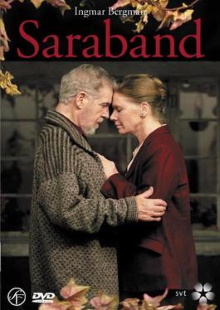This was Ingmar Bergman’s last film and the sequel to Scenes from a Marriage. Just as it was made some 30 years after the television series, this film picks on up Marianne and Johan 30 years later as well. The premise is deceptive though as the main story is really about new characters, Johan’s son and granddaughter from a later relationship, rather than the old couple. This allows Bergman to explore fresh themes, in this case the relationship between a parent and a child, and that is welcome but it is a chore to muster up enthusiasm for entirely new characters who are unknown to us.
Her second husband long dead, Marianne decides, seemingly on a whim, to go visit Johan after not having seen him for more than 30 years. Johan now lives by himself in the countryside and is wealthy from an inheritance. However Johan’s son from another relationship, Henrik, lives in a nearby cottage that Johan owns with his own daughter Karin. Henrik has never recovered from the death of his wife two years ago and now has an unhealthily close relationship with Karin. As Marianne stays in Johan’s house for a while, Karin comes to talk and confide in her. At the age of 18, she is talented cello player, trained entirely by Henrik. She understands that she needs to break free of her father to live her own life but fears what will happen to him if she leaves. Johan meanwhile despises Henrik who he considers useless and financially insolvent but does have some sympathy for Karin.
This film really is about the relationship between Henrik and Karin, two entirely new characters, plus a bit about the mutual antagonism between Johan and Henrik. Marianne is there as an outside observer. The old couple do have their scenes together of course but their first meeting after being apart for so long sets the tone. They catch up on each other’s lives for a little while and then fall back on their easy familiarity without having much else to say. It feels like the previous series has already explored their relationship so thoroughly that Bergman has little to add to it. Both are much older now, old enough that they are far past the age for sex and thoroughly disabused of any illusions about who the other person really is. I’m still not sure why Marianne chose to spend what seems like a few weeks at least at Johan’s house, perhaps treating it as a sort of holiday? It feels unsatisfactory as the real reason seems to be that Bergman just needed her there to provide closure.
The inappropriate intimacy between Henrik and Karin makes for a worthy subject though the film’s focus is on how dependent Henrik has become on his daughter rather than any harm he might have done to her. Still I don’t think this is a particularly brilliant or original take except that the film also uses it to contrast with parent-child relationships that are unusually distant or non-existent. Johan and Henrik mutually loathe each other for reasons that aren’t entirely clear to me while Marianne has a daughter with an unspecified mental ailment who she is unable to communicate with. There is the same kind of brutal honesty here that the original series was so widely lauded for. Yet what was revolutionary in the 1970s is just the minimum bar for a serious film in the 2000s and Saraband doesn’t seem to have much else in its favor.
It seems obvious that this was made mainly to bank on the success and reputation of Scenes from a Marriage. Many people would have been watching to learn what becomes of Marianne and Johan and this film is a disappointment in that regard as life simply goes on for the two of them along the previously set trajectory. It’s realistic but not very dramatic. All in all, this is a low-key, minor work by this grandmaster of cinema. It’s not bad but it’s nothing unmissable either.
